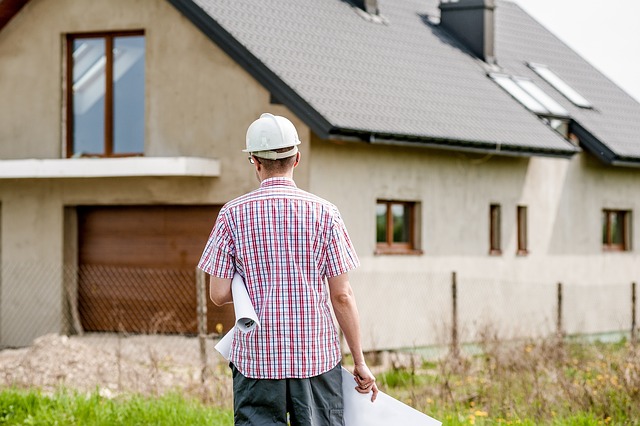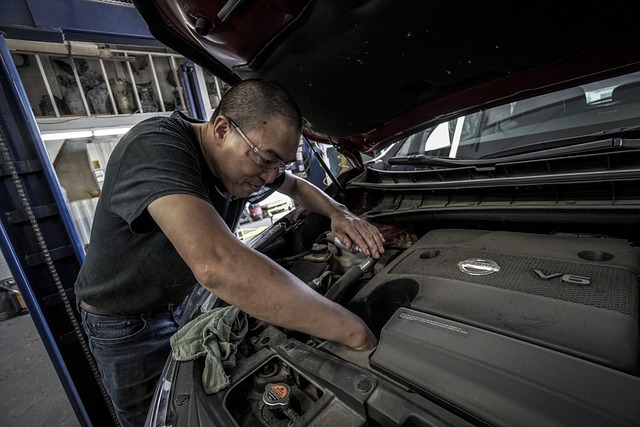When installing new appliances, adherence to safety and efficiency standards is paramount for their longevity and to prevent future repair needs. Always consult the manufacturer's manual for installation specifics to avoid potential fire risks or malfunctions. For those lacking technical skills, hiring a licensed professional for the job is advisable. Proper leveling, secure connections, and maintaining clearance from combustible materials as per building codes and user manuals are crucial for safe installations. Regular home repair and maintenance checks are essential for addressing common appliance issues. Cleaning refrigerator coils, inspecting dishwasher filters and pumps, and checking washing machine hoses and dryer vents can prevent costly repairs down the line. Keeping a maintenance log and following manufacturer guidelines help track appliance service history and enable timely and effective fixes when needed. In essence, a consistent home repair and maintenance routine is essential for ensuring your appliances operate efficiently and have a longer operational life.
When it comes to maintaining a well-functioning household, appliance installation and repair stand as pivotal tasks for homeowners. This article delves into the nuances of appliance servicing, from optimal installation practices to tackling common issues with practical repair techniques. Home Repair and Maintenance are key to ensuring your kitchen and laundry gadgets perform at their best. We’ll guide you through maintenance tips that can extend the lifespan of these essential tools, keeping your home running smoothly. Join us as we explore how to keep your appliances in top shape.
- Understanding Appliance Installation Best Practices for Homeowners
- Troubleshooting Common Appliance Issues and Repair Techniques
- Maintenance Tips to Extend the Lifespan of Your Home Appliances
Understanding Appliance Installation Best Practices for Homeowners

When embarking on appliance installation in your home, adherence to best practices is paramount for both safety and longevity of the appliance. Proper installation can prevent future home repair and maintenance issues, ensuring your appliances operate efficiently. Homeowners should begin by carefully reading the manufacturer’s manual, which provides specific guidelines tailored to the make and model of their new appliance. This includes understanding the required electrical and plumbing connections, as incorrect hookups can lead to malfunctions or even pose fire hazards.
Next, it’s crucial to select a qualified professional for installation if you lack the necessary technical expertise. A licensed technician will not only follow manufacturer instructions but also perform a thorough inspection to confirm that the appliance is level and securely connected, thus reducing the risk of leaks or electrical shorts. Furthermore, during installation, consider the proximity of the appliance to combustible materials to maintain a safe clearance, as outlined in building codes and the user manual. By following these home repair and maintenance protocols during installation, you can avoid costly and time-consuming fixes down the line, ensuring your home remains a safe and functional space for years to come.
Troubleshooting Common Appliance Issues and Repair Techniques

When encountering common appliance issues, homeowners often rely on their understanding of home repair and maintenance to troubleshoot effectively. A consistent approach to diagnosing problems can save time and prevent further damage. For instance, if a refrigerator is not cooling properly, checking the condenser coils for dust accumulation is a standard first step. This simple maintenance task can greatly impact the appliance’s performance. Similarly, a dishwasher that fails to drain might have a clogged filter or an issue with its pump. Identifying such issues requires a methodical examination of components, which is where basic repair skills come into play. Homeowners should be familiar with the owner’s manual for specific appliance models, as it often provides valuable insights into common malfunctions and recommended repair techniques. Regular maintenance checks, such as inspecting hoses, connections, and electrical components, can help catch problems early, reducing the need for extensive repairs. By staying informed about standard home repair practices and maintaining a routine schedule of checks and cleaning, homeowners can effectively address appliance issues and extend their lifespan.
Maintenance Tips to Extend the Lifespan of Your Home Appliances

Regular maintenance is a key factor in extending the lifespan of your home appliances, thereby saving time and money on frequent repairs or premature replacements. To ensure your appliances operate efficiently for years to come, it’s advisable to perform routine checks and cleaning. For instance, refrigerators should have their coils cleaned at least once a year to maintain optimal cooling performance. Washing machines benefit from regular inspection of hoses and seals to prevent leaks, while dryers should have their lint traps cleared after each use and the vents inspected annually for blockages.
When it comes to appliance repair, addressing issues promptly can prevent minor problems from escalating into more costly ones. It’s important to stay vigilant about signs of wear or malfunction, such as unusual sounds during operation, ineffective performance, or visible damages. Keeping a maintenance log can help track the history of your appliances, including repairs and service dates, which can inform more timely and effective interventions when needed. Additionally, adhering to the manufacturer’s guidelines for use and care, as well as scheduling professional service checks, can further prolong the life of your home appliances. Remember, a proactive approach to maintenance is instrumental in the longevity and performance of your home repair and maintenance investments.
Homeowners can enhance their living spaces by ensuring appliance installation is performed safely and efficiently, thereby avoiding potential hazards. When issues arise, understanding common malfunctions and employing effective repair techniques empowers homeowners to address problems promptly. Regular maintenance, a cornerstone of home repair and maintenance best practices, plays a pivotal role in extending the lifespan and optimal performance of household appliances. By adhering to the guidelines outlined in this article, homeowners can safeguard their investments and maintain a smoothly functioning home environment.
